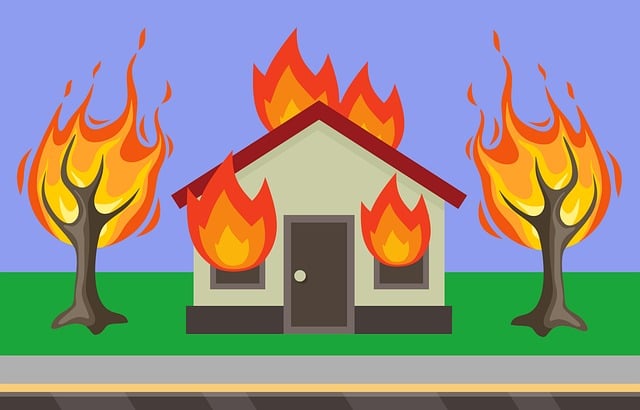When disaster strikes and your home becomes uninhabitable due to a covered peril, the impact on your life can be profound. It’s during these times that personal property coverage within your homeowners or renters insurance policy proves invaluable. This comprehensive guide will navigate the intricacies of loss of use insurance, detailing how it helps mitigate additional living expenses when your abode is under repair. We’ll explore the essentials of property damage protection, the advantages of replacement cost insurance for personal belongings, and the role of liability coverage in such scenarios. Understanding these aspects ensures that you’re prepared should your home require extensive repairs, leaving you with a safety net rather than facing financial strain or homelessness.
- Navigating Home Uninhabitability: The Role of Personal Property Insurance and Loss of Use Coverage
- Understanding Your Homeowners Policy: What to Expect from Property Damage Protection
- Renters Insurance as a Safety Net: Ensuring Coverage for Your Personal Belongings
- The Importance of Replacement Cost Insurance in Maintaining Living Standards Post-Disaster
- Beyond Physical Repairs: Liability Coverage in Unexpected Situations
- Maximizing Your Loss of Use Insurance Benefits During Temporary Housing Arrangements
Navigating Home Uninhabitability: The Role of Personal Property Insurance and Loss of Use Coverage

When a covered peril renders your home uninhabitable, personal property coverage within your homeowners or renters insurance serves as a safety net for your belongings. This form of protection is designed to provide reimbursement for the loss of your personal items up to the replacement cost without deducting for depreciation. In such scenarios, loss of use insurance, a critical component of comprehensive policies, steps in to support you further. It offers financial assistance to cover additional living expenses that arise when you’re temporarily relocated due to necessary repairs. This means that if you’re forced out of your home and require temporary housing like an apartment or hotel stays, loss of use insurance can help mitigate the financial burden. It’s essential for policyholders to fully understand their coverage for property damage protection, as this will dictate what is included under additional living expenses. Loss of use coverage can reimburse you for costs such as hotel rooms, restaurant meals, and other necessary expenses incurred during the time your home is being restored. This ensures that you are not left without a roof over your head or facing unexpected financial strain during an already stressful period. Both homeowners and renters insurance policies should be carefully reviewed to ensure adequate protection, as loss of use coverage can vary between policies. Policyholders should also consider the importance of liability coverage, which, while different from loss of use insurance, is equally vital in protecting you against claims or lawsuits resulting from accidents happening on your property. With thorough understanding and appropriate coverage in place, policyholders can navigate the challenges of home uninhabitability with greater confidence and security.
Understanding Your Homeowners Policy: What to Expect from Property Damage Protection

When your home suffers damage from a peril outlined in your homeowners insurance policy, such as a fire or a natural disaster, the repercussions extend beyond the immediate destruction. Personal property coverage within your homeowners or renters insurance is designed to protect your personal belongings from such events. This aspect of your insurance safeguards items like furniture, electronics, and clothing against loss or damage. It’s crucial to understand that personal property coverage typically reimburses you for the actual cash value or the replacement cost of your lost or damaged possessions, depending on the policy details you’ve selected.
In addition to safeguarding your belongings, homeowners insurance also includes vital provisions like liability coverage and loss of use insurance. Liability coverage offers financial protection should someone be injured on your property and decide to take legal action against you. It can cover medical expenses, legal fees, and compensation for the injured party. On the other hand, loss of use insurance, also known as additional living expenses (ALE) coverage, kicks in when your home becomes uninhabitable. This provision helps cover the extra costs you’ll incur while seeking alternative living arrangements, such as hotel stays or temporary rental properties. The ALE coverage is a critical component that ensures you have a roof over your head during the repair process, avoiding both the inconvenience and financial strain of sudden displacement. It’s important to review your policy to understand the limits and conditions associated with these coverages, ensuring you are adequately protected in the event of property damage.
Renters Insurance as a Safety Net: Ensuring Coverage for Your Personal Belongings

When disaster strikes and your dwelling becomes uninhabitable due to a covered peril such as a fire or natural disaster, having the right insurance coverage can be a lifeline. Homeowners insurance typically includes personal property coverage, which extends beyond the structure itself to protect your personal belongings. This aspect of homeowners insurance ensures that the items within your home are safeguarded against damage or theft. For those who rent, renters insurance serves as an equally vital safety net, offering similar protection for personal belongings while residing in someone else’s property. This coverage is designed to reimburse you for the actual cash value or the replacement cost of your items, depending on the policy you select.
In addition to safeguarding your possessions, a comprehensive renters insurance or homeowners insurance policy also encompasses loss of use insurance. This provision is crucial when unexpected events force you out of your home, as it helps cover additional living expenses. This can include costs associated with temporary housing solutions like hotel stays or short-term rentals. The goal is to minimize the financial burden on you during an already stressful time. Furthermore, liability coverage within these policies provides an additional layer of protection by offering financial support should someone be injured on your property and decide to sue you for damages. By understanding the extent of your personal property coverage and what your policy entails, you can rest easier knowing that both your homeowners insurance or renters insurance is not just about compensating for property damage but also about ensuring your well-being and security even when you’re temporarily away from your home.
The Importance of Replacement Cost Insurance in Maintaining Living Standards Post-Disaster

When disaster strikes and your home is rendered uninhabitable, maintaining your living standards becomes paramount. Personal property coverage within homeowners or renters insurance policies plays a crucial role in this scenario. It extends beyond mere compensation for the lost or damaged personal belongings; it’s about ensuring that you can continue your life with minimal disruption. Replacement cost insurance is a significant aspect of this coverage, as it reimburses you for the actual cash value of your possessions without accounting for depreciation—essentially, it helps you restore your property to its pre-loss condition.
In the event of extensive damage, loss of use insurance becomes invaluable, offering a safety net for additional living expenses. This provision typically covers the costs associated with temporary housing, such as hotel stays or short-term leases, allowing homeowners and renters alike to maintain their standard of living without financial strain. The scope of this coverage can vary, but it often includes reasonable expenses for food, lodging, and other necessities until your primary residence is livable again. Property damage protection, which encompasses loss of use insurance, is a testament to the comprehensive nature of robust homeowners or renters insurance policies. Furthermore, liability coverage within these policies offers an additional layer of security by protecting you against claims or lawsuits from third parties for property damage or bodily injury caused by you or your family members. This holistic approach to insurance ensures that policyholders are not left in a precarious position, navigating both the emotional toll of a disaster and the financial burden that can accompany it.
Beyond Physical Repairs: Liability Coverage in Unexpected Situations

When disaster strikes and your home becomes uninhabitable due to covered perils such as fire or natural disasters, it’s crucial for homeowners and renters alike to have comprehensive insurance coverage. Beyond the immediate need for physical repairs, your policy’s personal property coverage within homeowners or renters insurance is designed to compensate you for the loss or damage of your personal belongings. However, this aspect of insurance often doesn’t account for the additional living expenses incurred during the repair period. This is where loss of use insurance plays a pivotal role. It steps in to cover costs such as hotel stays, temporary rentals, and dining out, ensuring that policyholders are not left scrambling for funds to maintain their daily lives.
In addition to covering the physical damages, liability coverage is an indispensable component of a well-rounded insurance policy. It offers protection if someone is injured on your property or if you or your family members are held responsible for damaging someone else’s property. This coverage can provide financial support for legal fees, medical expenses, and compensation to the affected parties, safeguarding your assets from potential lawsuits. For those who have replacement cost insurance as part of their policy, they can receive funds to replace belongings with new items of similar kind and quality, rather than settling for the depreciated value. It’s important for policyholders to understand these coverages to ensure they are adequately protected in unexpected situations. With the right insurance in place, you can have peace of mind knowing that not only will your personal property be replaced, but you won’t face financial strain from additional living expenses or liability claims during a time when you’re already dealing with the stress of property damage.
Maximizing Your Loss of Use Insurance Benefits During Temporary Housing Arrangements

When your home is rendered uninhabitable by a covered peril, maximizing the benefits of your loss of use insurance becomes paramount. Understanding the extent of your personal property coverage within your homeowners or renters insurance policy is crucial. This type of coverage typically extends to include additional living expenses when you’re temporarily displaced. To make the most of this provision, it’s advisable to review your policy’s limits and understand what is covered for loss of use. Ensure that you keep all receipts related to your temporary housing arrangements, including hotel stays or temporary rentals, as these are considered additional living expenses. These receipts will substantiate your claims for reimbursement under your loss of use insurance.
Furthermore, when selecting temporary accommodations, consider properties that align with your property damage protection needs. If you have replacement cost insurance as part of your personal belongings insurance, it’s important to select a living arrangement where your possessions can be safely stored or replaced. Additionally, don’t overlook the importance of liability coverage during this time; if someone is injured at your temporary residence, you’ll want to be certain that your policy provides adequate protection. By being proactive and informed about these aspects of your insurance, you can navigate the disruption caused by property damage with greater ease and financial security.
When facing the aftermath of a disaster that renders your home uninhabitable, the importance of robust personal property coverage within your homeowners or renters insurance cannot be overstated. Loss of use insurance is a critical component, offering financial support for additional living expenses during the recovery period. This assurance mitigates the distress of displacement and prevents unexpected financial burdens. By thoroughly understanding your policy’s provisions for property damage protection and replacement cost insurance, you can navigate such unpredictable events with greater confidence. Additionally, liability coverage serves as a safeguard in unexpected scenarios, ensuring that your personal belongings are adequately protected. In sum, comprehensive insurance is essential to maintain living standards post-disaster and safeguard your quality of life when home repairs are necessary.



